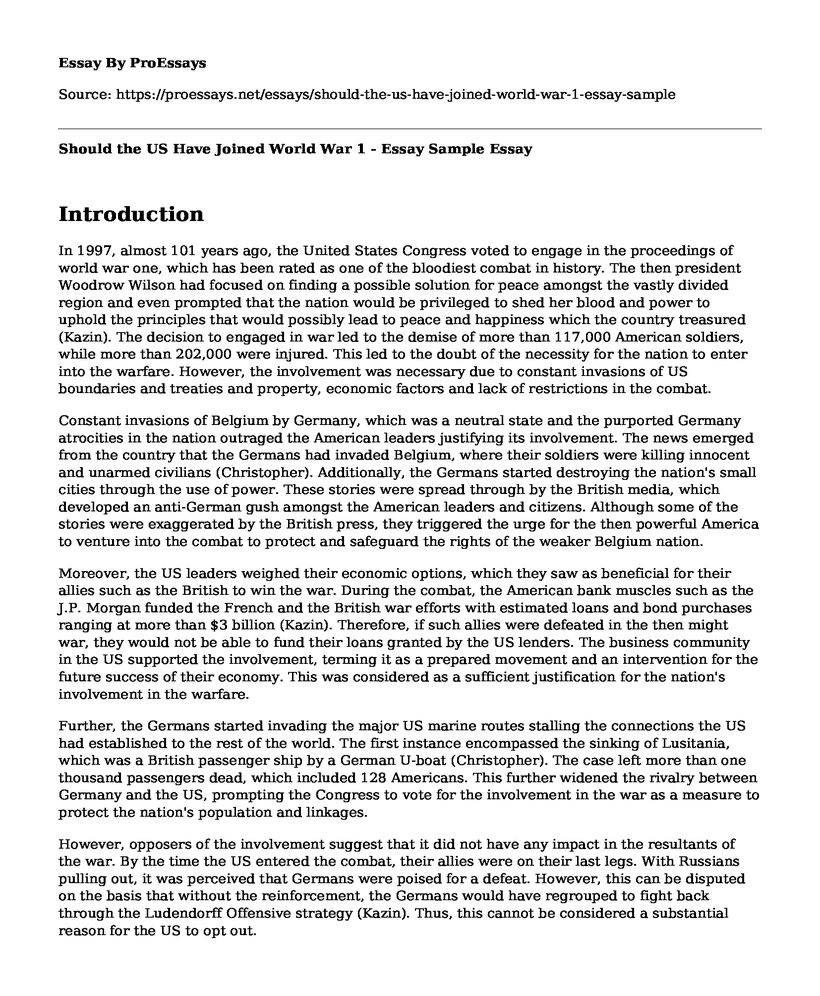Introduction
In 1997, almost 101 years ago, the United States Congress voted to engage in the proceedings of world war one, which has been rated as one of the bloodiest combat in history. The then president Woodrow Wilson had focused on finding a possible solution for peace amongst the vastly divided region and even prompted that the nation would be privileged to shed her blood and power to uphold the principles that would possibly lead to peace and happiness which the country treasured (Kazin). The decision to engaged in war led to the demise of more than 117,000 American soldiers, while more than 202,000 were injured. This led to the doubt of the necessity for the nation to enter into the warfare. However, the involvement was necessary due to constant invasions of US boundaries and treaties and property, economic factors and lack of restrictions in the combat.
Constant invasions of Belgium by Germany, which was a neutral state and the purported Germany atrocities in the nation outraged the American leaders justifying its involvement. The news emerged from the country that the Germans had invaded Belgium, where their soldiers were killing innocent and unarmed civilians (Christopher). Additionally, the Germans started destroying the nation's small cities through the use of power. These stories were spread through by the British media, which developed an anti-German gush amongst the American leaders and citizens. Although some of the stories were exaggerated by the British press, they triggered the urge for the then powerful America to venture into the combat to protect and safeguard the rights of the weaker Belgium nation.
Moreover, the US leaders weighed their economic options, which they saw as beneficial for their allies such as the British to win the war. During the combat, the American bank muscles such as the J.P. Morgan funded the French and the British war efforts with estimated loans and bond purchases ranging at more than $3 billion (Kazin). Therefore, if such allies were defeated in the then might war, they would not be able to fund their loans granted by the US lenders. The business community in the US supported the involvement, terming it as a prepared movement and an intervention for the future success of their economy. This was considered as a sufficient justification for the nation's involvement in the warfare.
Further, the Germans started invading the major US marine routes stalling the connections the US had established to the rest of the world. The first instance encompassed the sinking of Lusitania, which was a British passenger ship by a German U-boat (Christopher). The case left more than one thousand passengers dead, which included 128 Americans. This further widened the rivalry between Germany and the US, prompting the Congress to vote for the involvement in the war as a measure to protect the nation's population and linkages.
However, opposers of the involvement suggest that it did not have any impact in the resultants of the war. By the time the US entered the combat, their allies were on their last legs. With Russians pulling out, it was perceived that Germans were poised for a defeat. However, this can be disputed on the basis that without the reinforcement, the Germans would have regrouped to fight back through the Ludendorff Offensive strategy (Kazin). Thus, this cannot be considered a substantial reason for the US to opt out.
Conclusion
In conclusion, the involvement was necessary due to constant invasions of US boundaries and treaties and property, economic factors and lack of restrictions in the warfare. For instance, constant attacks of Belgium by Germany and the purported Germany atrocities facilitated the need for involvement. Additionally, the US leaders weighed their economic options, which they saw as beneficial for their allies such as the British to win the war, and the move by Germans to invade the major US marine routes justified the involvement of the US in safeguarding its global and security goals.
Works Cited
Christopher, Klein. "History Faceoff: Should The U.S. Have Entered World War I?". History TV, 2018, https://www.history.com/news/history-faceoff-should-the-u-s-have-entered-world-war-i. Accessed 31 May 2018.
Kazin, Michael. "Opinion | Should America Have Entered World War I?". Nytimes.Com, 2017, https://www.nytimes.com/2017/04/06/opinion/should-America-have-entered-world-war-i.html. Accessed 31 May 2018.
Cite this page
Should the US Have Joined World War 1 - Essay Sample. (2022, Jun 10). Retrieved from https://proessays.net/essays/should-the-us-have-joined-world-war-1-essay-sample
If you are the original author of this essay and no longer wish to have it published on the ProEssays website, please click below to request its removal:
- Research Paper on History: Franklin Papers
- Political Causes of American Civil War Essay Example
- Modern Chinese Literature: Rejecting Tradition, Embracing West - Essay Sample
- Essay Example on Spartan Hegemony: Unsuccessful & Athenian Alliance/League Difference
- French Colonialism & Nigerian Independence Movements - Essay Sample
- Essay Example on CDA 1998: Reforming UK's Failing Youth Justice System
- Free Essay on Governing a State: Ethical Dilemmas and Legal Challenges







